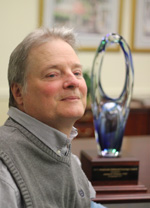|
James S. Krause, Ph.D., has had a
few months of looking at his sleek
2011 Medtronic National Courage
Award to adjust to what it feels
like to join the ranks of former
recipients such as Stephen Hawking
and Christopher Reeve.
 Krause, who suffered
a paralyzing spinal cord injury
while diving when he was 16, now
is a professor and associate dean
for research in the College of
Health Professions and a leading
national expert and researcher who
specializes in health and
longevity following a spinal cord
injury. He said the award has
increased his resolve to continue
efforts in those areas. Krause, who suffered
a paralyzing spinal cord injury
while diving when he was 16, now
is a professor and associate dean
for research in the College of
Health Professions and a leading
national expert and researcher who
specializes in health and
longevity following a spinal cord
injury. He said the award has
increased his resolve to continue
efforts in those areas.
The award is
especially meaningful to Krause,
since he was a patient from
1976-79 at Minneapolis' Courage
Center's Transitional
Rehabilitation Program, known then
as Courage Residence. A three-year
inpatient stay at Courage Center
was common in the 1970s and 1980s.
Today, the average length of stay
for someone with a spinal cord
injury is 99 days.
"I am honored
beyond anything that can easily be
put into words," said Krause of
his award. "I was a Courage Center
inpatient for more than three
years and certainly would not have
been able to accomplish nearly as
much as I have without the benefit
of the services I received there.
It gave me a foundation from which
to build. The friendships I
developed there have lasted.
Receiving this award will help me
continue my work and to positively
impact the lives of people with
disabilities."
Ironically, in
many respects, life is much more
challenging 40 years later.
"There has been
some visible change in terms of
accessibility, but there are other
barriers that continue. Traveling
has become more complicated. When
I was at Courage Center, things
were simpler. People had the
opportunity to use facilities for
a much longer period of time and
the benefits are likely
proportional to the time allocated
for preparing for life after
disability. The time I spent at
Courage Center has had an
immeasurable positive effect on my
life. Whereas I was there for over
three years while I was going to
school, people now are there for
perhaps three months, just enough
time to get some rehabilitative
services. It would be much more
difficult under those
circumstances."
Krause said barriers often prevent
people with disabilities to be
able to work, even for those who
have the intelligence and
motivation. "I believe that
creating employment opportunities
and facilitating education and
socioeconomic status are the keys
to improving quality of life for
people with disabling conditions."
After leaving
Courage Center, Krause received
his bachelor's degree in 1980 and
his Ph.D. in 1990 from the
Department of Psychology at the
University of Minnesota. He worked
at the Shepherd Center in Atlanta,
a nationally-known rehabilitation
facility, for 13 years. His career
includes numerous published
articles in professional journals,
as well as numerous awards. In
2008, Krause was inducted into the
Spinal Cord Injury Hall of Fame by
the National Association for his
research in quality of life.
Krause said the
awards ceremony Sept. 24 at Earle
Brown Heritage Center in Minnesota
was wonderful, and he was able to
share the moment with his wife,
Laura, friends and colleagues.
It also is an
opportunity to get out a message
of hope, he said. "People often
focus on recovery and place their
hope for a good life on the extent
of their physical recovery. I want
people to know that, under any
circumstance, disability or
otherwise, there is hope. It's
important to develop goals and
live with whatever circumstance
you have. Focus on the things that
are within your control. Be
concerned about the present and
the future, not about the past or
lost opportunities. I truly
believe that when one door closes,
another opens. You have to look
for, and sometimes make, those
opportunities."
|



 Krause, who suffered
a paralyzing spinal cord injury
while diving when he was 16, now
is a professor and associate dean
for research in the College of
Health Professions and a leading
national expert and researcher who
specializes in health and
longevity following a spinal cord
injury. He said the award has
increased his resolve to continue
efforts in those areas.
Krause, who suffered
a paralyzing spinal cord injury
while diving when he was 16, now
is a professor and associate dean
for research in the College of
Health Professions and a leading
national expert and researcher who
specializes in health and
longevity following a spinal cord
injury. He said the award has
increased his resolve to continue
efforts in those areas.